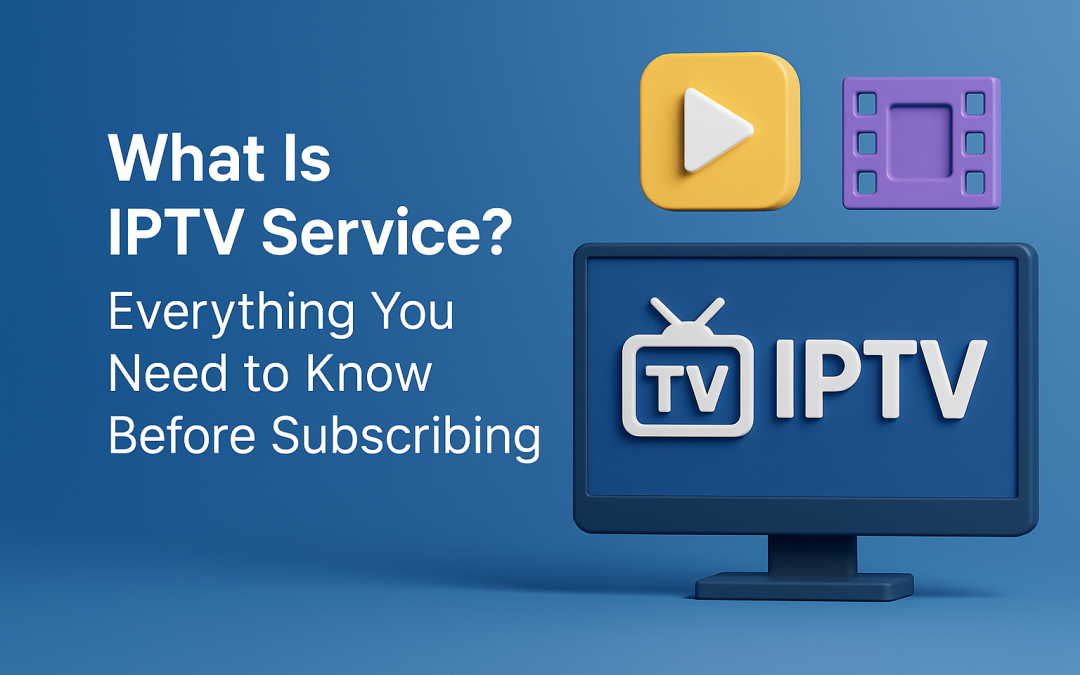Introduction
In today’s digital era, streaming content has become the norm, and IPTV service is at the forefront of this revolution. IPTV, or Internet Protocol Television, delivers television content through the internet instead of traditional cable or satellite formats. This shift provides a more personalized, flexible, and interactive viewing experience.
An IPTV allows users to stream live channels, video-on-demand, and even time-shifted media directly to their devices. With the rise of high-speed internet connections, millions are now turning to IPTV to meet their entertainment needs.
How IPTV Service Works
Understanding how an IPTV service functions is essential before subscribing. Unlike traditional broadcasting, IPTV uses your internet connection to transmit video content.
Here’s a simplified breakdown of how IPTV works:
-
Content acquisition: IPTV providers obtain licensing or partner with content creators.
-
Encoding and formatting: Content is digitized, compressed, and formatted for streaming.
-
Streaming: The content is delivered via a secure IP network to users.
-
Access: Users log into an app or platform on a device to watch the content.
This method ensures minimal lag, better video quality, and more interactive services compared to cable TV.
Types of IPTV
IPTV services come in several formats to suit different needs. Here are the primary types:
1. Live Television
Real-time broadcasting of TV channels, similar to traditional cable or satellite services.
2. Video on Demand (VOD)
Users can select and watch videos whenever they want, just like Netflix or Amazon Prime.
3. Time-Shifted Media
Missed your favorite show? Time-shifted IPTV lets you watch previously aired programs.
4. Catch-Up TV
Some IPTV services offer the last 7-14 days of previously broadcast shows.
Advantages of Using an IPTV
There are many reasons why more people are switching to IPTV. Here are some major benefits of using an IPTV service:
-
Flexible Viewing: Watch your favorite shows anytime, anywhere.
-
Device Compatibility: Works on Smart TVs, smartphones, tablets, and PCs.
-
No Contract: Most IPTV providers offer monthly plans with no long-term commitments.
-
Cost-effective: Often cheaper than traditional cable services.
-
Wide Content Access: Access to international channels, premium sports, and VOD.
Top Features to Look For in an IPTV
Choosing the right IPTV provider requires careful consideration. Look for these key features in a reliable IPTV service:
-
High-quality streaming: 4K or HD content support.
-
Stable servers: Minimizes buffering and downtimes.
-
EPG (Electronic Program Guide): Helps you browse channels and schedules.
-
Multi-device support: Simultaneous streaming on different devices.
-
Customer support: Responsive help for technical issues.
Popular Devices Compatible with IPTV Service
The versatility of IPTV lies in its compatibility with multiple platforms. Here are the most commonly used devices for accessing an IPTV service:
-
Smart TVs: Samsung, LG, Sony, etc.
-
Amazon Firestick and Fire TV
-
Android Boxes and Android TVs
-
Roku Devices
-
PCs and Laptops
-
Smartphones and Tablets
Always check if your provider offers a compatible app or portal for your device.
How to Choose the Right IPTV Service
With hundreds of providers on the market, finding a trustworthy IPTV service can be tricky. Use these criteria:
-
Reviews and ratings: Look for user feedback online.
-
Trial period: Prefer providers offering free or discounted trials.
-
Channel lineup: Ensure the service has your favorite channels.
-
Security and privacy: Use services that respect user data and support VPN compatibility.
-
Content variety: Sports, movies, news, kids’ shows, and more.
Pricing and Subscription Models
The cost of an IPTV service varies widely depending on the features and content included. Common pricing models include:
| Plan Type | Price Range | Features |
|---|---|---|
| Monthly | $5 – $15 | Full HD, 1000+ channels, VOD |
| Quarterly | $20 – $40 | Multi-device, EPG support |
| Yearly | $60 – $120 | Best value, customer support |
Many users opt for monthly subscriptions initially and upgrade once satisfied.
Is IPTV Legal? What You Should Know
The legality of IPTV services can be a gray area. Here’s what you need to understand:
-
Legal IPTV services: These have proper licenses and distribution rights (e.g., Sling TV, Hulu Live).
-
Illegal IPTV services: These offer pirated content without authorization. Using them can expose you to legal and security risks.
Always verify the legality of your IPTV service before subscribing and consider using a VPN to enhance privacy.
Common Issues and Troubleshooting Tips
Even the best IPTV services may experience occasional hiccups. Here are common issues and solutions:
-
Buffering: Reduce resolution or use a wired internet connection.
-
Login issues: Double-check username/password and app version.
-
Freezing streams: Restart your device or switch servers.
-
Audio/video sync: Refresh the stream or change the player.
-
Unavailable channels: Contact support for real-time updates.
Having a stable internet speed of at least 25 Mbps is recommended for HD streaming.
Conclusion
If you’re tired of overpriced cable bills and limited content, an IPTV service might be the perfect solution. It offers flexibility, affordability, and variety that traditional broadcasting cannot match. However, it’s vital to research and choose a reputable provider to ensure a secure and satisfying experience.
Whether you’re a movie enthusiast, a sports fan, or just love flipping through channels, an IPTV can transform your entertainment journey.
Call to Action
Ready to experience seamless streaming with unbeatable value? Explore the best IPTV service providers today and take your entertainment to the next level!
Compare Top IPTV Services Now
FAQs
1. What is an IPTV service?
An IPTV service delivers TV content through the internet instead of traditional broadcasting methods like cable or satellite.
2. Is IPTV legal in the USA and Canada?
Legal IPTV services that have the rights to distribute content are permitted. Avoid services that offer pirated channels.
3. Can I use IPTV on multiple devices?
Yes, most IPTV providers support multi-device streaming, though some plans may limit concurrent users.
4. Do I need a VPN for IPTV?
Using a VPN is recommended for added privacy and to bypass geo-restrictions, especially with international content.
5. What speed internet is required for IPTV service?
A stable internet speed of 15–25 Mbps is ideal for HD content and seamless performance.


Recent Comments